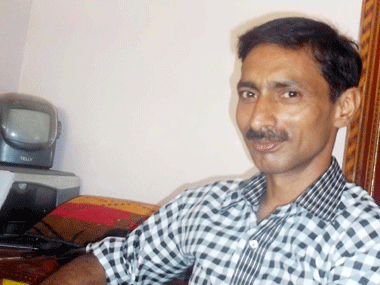Uttar Pradesh, Jun 14: The Uttar Pradesh government has suspended five policemen, suspected to be involved in the murder of a scribe in Shahjahanpur district this week, even as the family of the journalist sought CBI probe into the incident.
 UP minister Ram Murti Verma, who has been accused of orchestrating the murder and was named in the FIR, is reportedly on the run.
UP minister Ram Murti Verma, who has been accused of orchestrating the murder and was named in the FIR, is reportedly on the run.
The deceased journalist's elder son sought a CBI probe into the incident. He said that he will write to Prime Minister Narendra Modi in this regard. He also alleged that he was being pressurised to hush up the matter by people "close" to the minister, who were also offering him bribe and a government job.
Meanwhile, SP leader Mithilesh Kumar was heckled and confronted by agitated family members of Singh when he went to his house in Shahjahanpur.
The action against the policemen came a day after Governor Ram Naik took up the matter with Chief Minister Akhilesh Yadav after a massive outcry against the incident in which a minister Ram Murti Singh Verma allegedly conspired.
"SP Shahjahanpur has suspended five policemen, including Station House Officer Shri Prakash Rai, with immediate effect," IG (Law and Order) A Satish Ganesh told reporters here.
The other four included Sub-Inspector Krantiveer Singh, Head Constable Subhash Chandra Yadav and constables Udayveer and Mansoor.
Journalist Jagendra Singh was allegedly set on fire during a police raid at his house in Awas Vikas Colony of Sadar Bazar area on June 1.
His family alleged that the police officials set him on fire. Singh succumbed to the injuries on June 8.
An FIR was registered against minister for Backward Classes Welfare Ram Murti Verma, Inspector (Chowk) Sri Prakash Rai, Gufran, Akash Gupta, Amit Pratap Singh and Bhure for killing Jagendra.
The journalist invited Verma's ire by posting reports on Facebook about illegal mining activities and land grabbing against the minister.
The FIR lodged against the minister by Singh's son alleged that the minister sent the team of policemen to his house who doused Singh with kerosene oil and set him on fire.
From his death bed, he narrated the incident to IG Amitabh Thakur and in his dying declaration went viral on news channels.
Meanwhile, the opposition parties termed the action taken by the state government as an "eyewash" and accused it of shielding the minister.
"First of all the action taken is too late. The government should have suspended the policemen immediately after the incident and arrested them," BJP spokesman Vijay Bahadur Pathak said.
He accused the government that instead of dismissing the minister, it was shielding it.
Even a ruling SP MLA from Lucknow, Ravidas Mehrotra has demanded sacking of the minister.
"Its a serious matter and henious crime. I request you (CM) to order a probe into the matter and remove Vermy from your ministry. Also, the guilty policemen should be immediately suspended and arrested," Mehrotra said in a letter to Chief Minister Akhilesh Yadav.





Comments
Add new comment